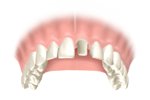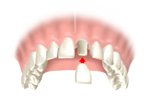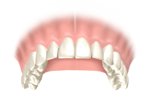Dental Crown

A dental crown or dental cap is a custom made restoration that covers a tooth with sustained significant loss of structure. They are analogical to being a thimble capped over your finger. Dental crowns are used to restore teeth to a certain shape and size. They provide strength and improves the appearance of the tooth.
Benefits of Dental Crowns
- dental crowns protect severely damaged tooth or tooth weakened by decay, fracture, large fillings or root canal therapy from fracturing. Teeth with large fillings tend to "flex more" forcing the tooth apart possibily causing stress fractures
- dental crowns hold together cracked or weaken teeth and seal the tooth from decay
- dental crowns cover discolored and irregularities in teeth in improving cosmetic appearance
- dental crowns help preserve the natural function and position of the teeth
- dental crowns restore tooth with large decay, cavities or filings
- dental crowns support the replacement teeth in a bridge
- dental crowns restore and maintains natural bite
- dental crowns acts as a false teeth over dental implants
- dental crowns can restore your smile
Types of Dental Crowns Materials
There are three basic types of materials for dental crowns:
- Porcelain fused to metal (PFM) dental crowns
- All porcelain dental crowns
- All metal dental crowns (Gold)
Porcelain fused to metal (PFM) dental crowns and all porcelain crowns are tooth colored crowns. PFM dental crowns offer the best combination of aesthetics and durability. PFM dental crowns are usually used to restore back teeth where the forces of chewing and grinding are strongest. All porcelain crowns are the most aesthetic and are used primarily used for front teeth where the need for strength is not as critical. Gold dental crowns are the most durable and offer the most precise fit. Gold dental crowns does not chip.
Crown Material



The all-ceramic porcelain crowns used at BIDC includes:
- Lava Zirconia from 3M
- Cercon from DeguDent
- IPS Empress from Ivoclar Vivadent
- Procera NobelEsthetics from Nobel Biocare
Procedure for Dental Crowns Treatment
The course of treatment described here is one of several options available at our dental clinic. Consult your dentist to find out what the best solution is for you, given your specific condition.
- First evaluation and crowns tooth preparation
- Local anesthesia is first adminstered at the region for crown tooth preparation
- The natural tooth is reshaped to receive the new dental crown
- Records are taken and approved with the patient to determine the color, bite, length and shape of the crown
- An impressionis taken for a replica model of the teeth
- This model is sent to a lab where the individual personal crown is fabricated
- A temporary crown is placed on whilst the permanent crown is made
- Fitting of crowns on delivery
- The temporary crown is removed
- The permanent crown is fitted and cemented into place on the teeth
- A quality assurance check is done for any re-adjustments or re-works of the dental crowns
- Care of crowns
- Brush and floss the crowns as recommended by your dentist or dental hygienist



Recovery Expectations
Both the preparation and placement of the temporary bridge as well as the bonding of the permanent bridge may cause some minor tenderness in the area. Some individuals may experience sensitivity in teeth. This sensitivity will disappear gradually over a few days to weeks.
Postcare Instructions for Dental Crowns
- Avoid chewing on or eating hard foods on the restorations for 24 hours from the time they were cemented
- To help with discomfort or swelling rinse your mouth 3xd with warm salt water. (1tsp. of salt in 8oz of water)
- Keep crown area clean to maintain tissue compatibility (the contour of the prosthesis must allow the surrounding tissue to conform to a natural, healthy position)
- Some sensitivity in teeth may be experienced by certain patients. This sensitivity will disappear gradually over a few days to weeks. If teeth are sensitive
- Avoid hot, cold or acidic food and beverages
- Pain medication be taken as directed as long as there is no medical contradiction based upon your medical history
- Use flouride rinse and toothpaste for sensivity teeth
- Clean teeth properly
Care for Dental Crowns
Dental crowns require the same regular and consistent home and professional dental care, as your natural teeth to prevent decay at the tooth-dental crown junction. To provide optimum longevity for your restorations, please follow the home care tips below:
- Brush after eating and before bedtime around the crown with a soft toothbrush, especially where the crown meets the gum line. At the gum line harmful bacteria can be harbored to cause decay and gum disease.
- Floss at least once to twice a day. Use the proxy brush or floss threader to remove plaque under and around these areas to maintain good oral hygiene. Buildup of food debris and plaque on your teeth and gums can become infected.
- Rinse with fluoride rinse before bed. Swish the fluoride rinse vigorously in your mouth for at least one minute. Do not swallow any of the rinse and do not eat or drink anything for 30 minutes
- Be careful about chewing toffees, gum, grainy rolls and tough food in this area
- See your dentist for regular professional check-ups and cleanings





